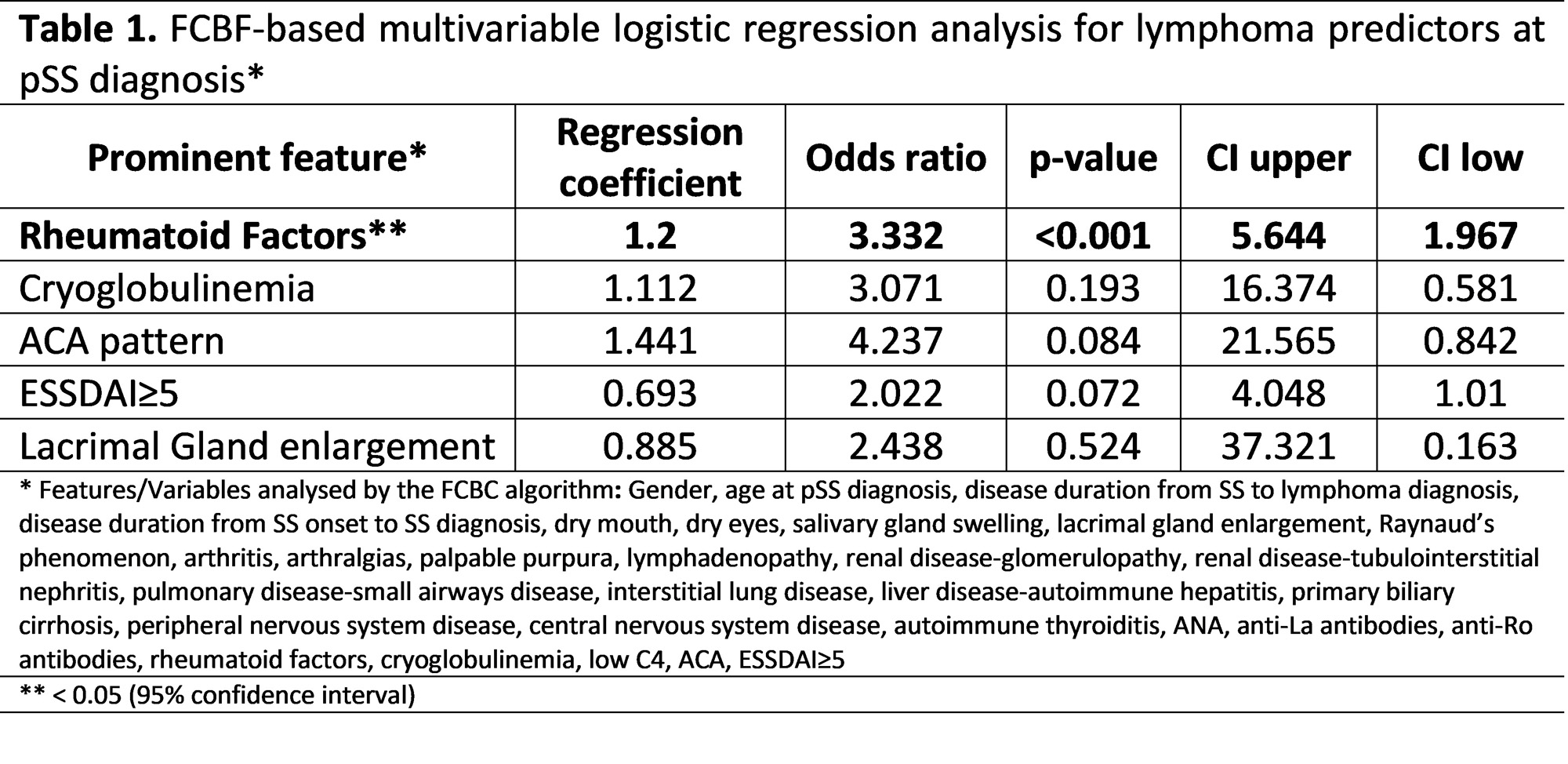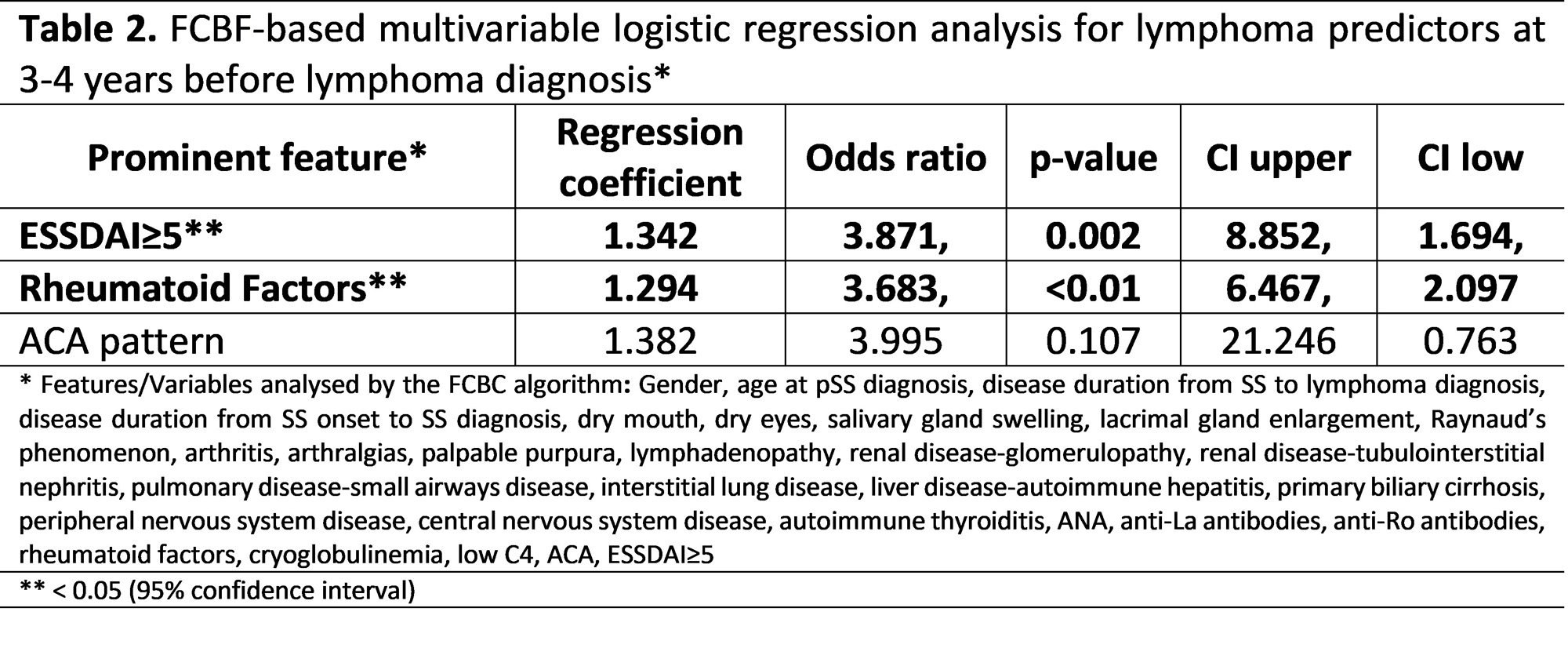Session Information
Date: Tuesday, November 14, 2023
Title: (2177–2194) Sjögren’s Syndrome – Basic & Clinical Science Poster II
Session Type: Poster Session C
Session Time: 9:00AM-11:00AM
Background/Purpose: Lymphoma is the most serious complication of primary Sjogren’s
syndrome (pSS), occurring as a late sequel during disease course. So far, lymphoma
predictors have been identified only at the time of pSS diagnosis in single center cohorts
using classical logistic regression models. The current work aims to study the evolution of
lymphoma predictors towards lymphoproliferation by employing data driven analysis on
totally harmonized pSS patients.
Methods: Two curated and harmonized datasets with pSS patients from3 centers (Athens,
Piza, Udine) were constructed to be analyzed for lymphoma predictors at two different time
points before lymphoma diagnosis. Each dataset incorporated the same set of 30 clinically
useful features covering the major aspects of the disease (Table 1, 2). The first dataset
included 80 lymphoma patients and non-lymphoma controls (1:1 ratio), representing the
time point of pSS diagnosis and the second dataset 68 lymphoma and non-lymphoma
controls (1:1 ratio) representing the time point of 3-4 years before lymphoma diagnosis. All
included patients fulfilled the 2016 ACR/EULAR criteria and non-lymphoma controls were
matched according to age, gender, disease duration from pSS diagnosis to last follow up and
treatment modalities. Systemic manifestations were defined as described in the ESSDAI
domains and for those not included in the ESSDAI system, either by tissue biopsy or by
applying international consensus criteria. A Fast-Correlation based feature selection
(FCBF)/logistic regression (LR) model with lymphoma as an outcome, was applied on both
datasets as described previously (1).
Results: Regarding the time point of pSS diagnosis, 5 prominent features in terms of
magnitude of order were identified by the FCBF algorithm as potential predictors including
rheumatoid Factor (RF), cryoglobulinemia, ACA pattern, ESSDAI≥5 and lacrimal gland
enlargement of which only RF was finally proven an independent lymphoma predictor
(Table 1). For the second time point of 3-4 years before lymphoma diagnosis, a similar set of
prominent features was found by the FCBF algorithm with the exception of lacrimal gland
enlargement and cryoglobulinemia while RF and ESSDAI≥5 were identified as independent
lymphoma risk factors (Table 2). Both FCBF/LR models had good overall performance after
10-fold cross validation strategy (pSS diagnosis: accuracy=63%, sensitivity=63%,
specificity=63%, AUC=76% and for the second time point of 3-4 years before lymphoma
diagnosis: accuracy=65%, sensitivity=65%, specificity=71%, AUC=75%).
Conclusion: Rheumatoid factor is the earliest and more persistent pSS associated lymphoma
predictor while high ESSDAI≥5 in combination with RF connote an advanced stage across the
lymphomagenesis process, predicting the occurrence of lymphoma in approximately 4 years
before.
To cite this abstract in AMA style:
Goules A, Chatzis L, pezoulas V, Ferro F, Manfrè V, Fotiadis D, Quartuccio L, Baldini C, De Vita S, Tzioufas A. Evolution of Lymphoma Predictors in Primary Sjogren’s Syndrome by Data Driven Analysis in Harmonized Patients [abstract]. Arthritis Rheumatol. 2023; 75 (suppl 9). https://acrabstracts.org/abstract/evolution-of-lymphoma-predictors-in-primary-sjogrens-syndrome-by-data-driven-analysis-in-harmonized-patients/. Accessed .« Back to ACR Convergence 2023
ACR Meeting Abstracts - https://acrabstracts.org/abstract/evolution-of-lymphoma-predictors-in-primary-sjogrens-syndrome-by-data-driven-analysis-in-harmonized-patients/


